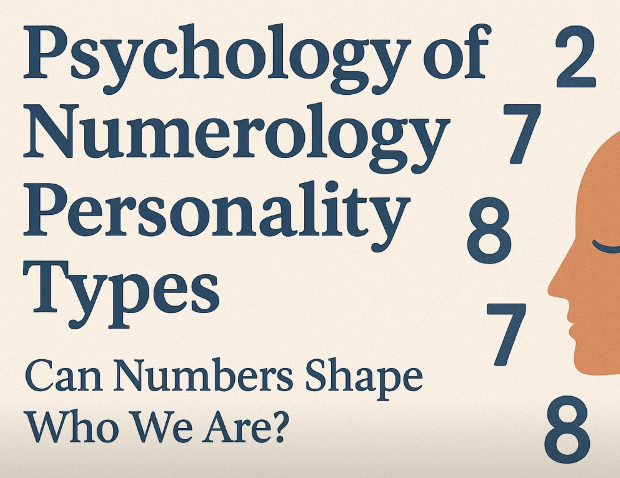Psychology of Numerology Personality Types: Can Numbers Shape Who We Are?
Discover how numerology personality types connect with modern psychology. Explore the science of why numbers feel meaningful, and learn how to use them for personal growth and self-awareness.
9/18/20253 min read


Introduction: Why Do Numbers Feel So Personal?
Think about the last time you read a description of your numerology personality type. Did it feel strangely accurate—like the number knew you better than some of your closest friends?
That “goosebumps moment” isn’t magic alone. Psychology offers fascinating insights into why these descriptions feel true, how personality typing works, and why humans have always turned to numbers and symbols to decode identity.
Numerology and psychology may seem worlds apart—one ancient and mystical, the other modern and scientific. But when combined, they reveal something powerful: we all crave a story that explains who we are.
What Are Numerology Personality Types?
In numerology, certain numbers are believed to represent personality archetypes. These are often calculated from a person’s birth date or name vibration. Each number (1 through 9, plus master numbers like 11 and 22) carries symbolic traits.
1: The Leader – independent, pioneering, determined.
2: The Peacemaker – empathetic, cooperative, sensitive.
3: The Creative – expressive, social, optimistic.
7: The Thinker – analytical, introspective, spiritual.
8: The Achiever – ambitious, disciplined, focused.
While psychology uses tools like the Big Five or Myers-Briggs, numerology offers its own symbolic “types” that feel like personality blueprints.
Why Do These Types Resonate? The Psychology Behind It
Humans are natural meaning-makers. Our brains love categories, patterns, and symbols. That’s why frameworks like the Enneagram, horoscopes, and numerology all thrive. But why do they feel so accurate?
The Barnum Effect
Psychology shows that people tend to accept broad, general statements as highly personal. If your number “7” says you’re thoughtful yet sometimes withdrawn—who doesn’t relate to that at times?Confirmation Bias
Once you identify with your number, you’ll notice every example that matches and downplay the mismatches. “See? I am a natural leader; my number 1 proves it.”Identity Reinforcement
Psychologists call it self-perception theory: if we believe something about ourselves, we begin to act in line with it. A “Number 3” who sees themselves as creative might actually start writing, painting, or speaking more.
When Numerology Becomes a Tool for Growth
Even if science doesn’t validate numerology as predictive, it can still act as a powerful reflective tool. In psychology, self-concept—our internal sense of who we are—directly impacts confidence, decision-making, and relationships.
By engaging with your number type, you’re effectively journaling with symbols. For example:
A Number 2 might explore how their peacemaking nature shows up in conflict, and whether they sometimes suppress their own needs.
A Number 8 could reflect on whether ambition drives them forward or creates burnout.
This isn’t fortune-telling. It’s structured self-reflection—something psychologists know can foster growth.
Benefits and Pitfalls of Personality Typing
Benefits:
Gives people a language for self-expression.
Creates community (people bond over shared numbers like they do with MBTI).
Encourages reflection on traits that might otherwise go unnoticed.
Pitfalls:
Risk of stereotyping (“I’m a 7, so I’ll never be good in social settings”).
Fatalism: believing numbers lock you into destiny.
Over-reliance on external definitions instead of inner awareness.
Psychology reminds us: personality is flexible. Numerology works best when used as a mirror, not a cage.
Practical Ways to Explore Your Number
Want to go beyond curiosity? Try blending numerology insights with psychological techniques:
Journaling Prompts
Write about moments in your life where your number’s traits were obvious—or when they weren’t. What patterns emerge?Big Five Comparison
Take a Big Five personality test and compare results to your number. Where do they overlap? Where do they differ?Coaching or Therapy Integration
Bring your number into a coaching or counseling session. It can spark conversations about strengths, fears, and blind spots.
Story Spotlight: Maria the Number 3
Maria, a 34-year-old designer, always identified with the “creative” side of her life path number 3. But she often struggled with confidence and worried she wasn’t “serious” enough for success. By reflecting on her number through journaling and therapy, she reframed creativity as a strength rather than a flaw. She started her own studio—and her self-esteem rose as she saw herself through a more empowered lens.
This is how numerology, when viewed through psychology, becomes a catalyst rather than a label.
Conclusion: A Meeting Point of Science and Symbol
Numerology personality types may not be peer-reviewed psychological theories, but psychology explains why they feel so real—and how they can genuinely impact self-understanding.
At their best, numbers are mirrors for reflection. At their worst, they’re rigid stereotypes. The key is to approach them with curiosity, not certainty.
If you use them to ask deeper questions, they can unlock self-awareness, growth, and even healing.
